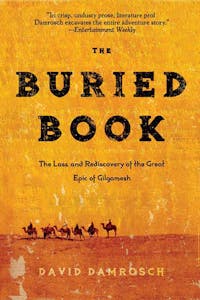The Buried Book
The Loss and Rediscovery of the Great Epic of Gilgamesh
 Download image
Download image
ISBN10: 0805087257
ISBN13: 9780805087253
Trade Paperback
336 Pages
$23.99
CA$26.99
Composed by a poet and priest in Middle Babylonia more than three thousand years ago, The Epic of Gilgamesh foreshadowed later stories that would become as fundamental as any in human history, The Odyssey and the Bible. But in 612 B.C., the clay tablets that bore the story were lost—buried in the burning ruins of the palace of Ashurbanipal, the last great king of Assyria, as his enemies laid his kingdom to waste.
The Buried Book begins with the rediscovery of the epic and its deciphering in 1872 by George Smith, a brilliant self-taught linguist who created a sensation when he discovered Gilgamesh among the thousands of tablets in the British Museum's collection. From there the story goes backward in time, all the way to Gilgamesh himself. Damrosch reveals the story as a literary bridge between East and West: a document lost in Babylonia, discovered by an Iraqi, decoded by an Englishman, and appropriated in novels by both Philip Roth and Saddam Hussein. This is a tale of history as it was written, stolen, lost, and—after 2,000 years, countless battles, fevered digs, conspiracies, and revelations—finally found.
Reviews
Praise for The Buried Book
"Useful, entertaining and informative . . . The Buried Book should help introduce new readers to an ancient classic that has really come into its own in the 21st century."—Michael Dirda, The Washington Post Book World
"Damrosch's artful, engrossing new history, The Buried Book, relates how the epic [story] of Gilamesh was lost and found—or rather how it was found and lost, since he tells the story backward, from the present to the past, in an archaeological fashion. It's a risky narrative gambit, and Damrosch is gifted enough to pull it off, no small feat."—Laura Miller, Salon
"With The Buried Book: The Loss and Rediscovery of the Epic of Gilgamesh, David Damrosch proves that the history of an epic can be as gripping as the epic itself. Damrosch tells a story of imperial exploitation and scholarly strife, individual struggles set against the rise and fall of empires . . . Jargon-free, The Buried Book is a fast-pacing scholarly adventure with an engaging cast of characters . . . The Buried Book is such a pleasurable read that, as Damrosch heads deeper into the past, it begins to feel like a kind of Disneyland: Mesopotamia. Damrosch takes the reader on an effortless ride from one juicy anecdote to the next. This entertainment value is the result of impressive research . . . The Buried Book succeeds admirably in giving the reader a taste of the strangeness of the historical periods Damrosch visits, as well as showing how the epic ties together cultures distant from each other in space and time."—The Harvard Book Review
"An altogether compelling narrative of a crucial episode in cultural history. This is a book that vividly demonstrates why humanism matters and how it is enhanced by exercising an unconventionally broad reach."—Robert Alter, author of The Five Books of Moses: A Translation with Commentary
"The Buried Book is a thrilling intellectual adventure: a brilliant study of Gilgamesh, it is also a rich and complex narrative of colonialist adventurers, obsessed scholars, anxious theologians, and contemporary writers all caught up in the ancient epic's amazingly wide net."—Stephen Greenblatt, author of Will In The World: How Shakespeare Became Shakespeare
"David Damrosch's The Buried Book is a remarkably original, narrative analysis of the loss, rediscovery, and literary-spiritual values of the ancient epic, Gilgamesh. There is somber wisdom and wit in Damrosch's comprehensive story, which finds room for Philip Roth's The Great American Novel and the murderous fictions of Saddam Hussein. It is salutary to be reminded by Damrosch that ultimately we and Islam share a common literary culture that commenced with Gilgamesh."—Harold Bloom, author of Where Shall Wisdom Be Found?
"A graceful example of how rigorous scholarship and erudition can inform and animate popular history."—Kirkus Reviews
"Damrosch offers an engaging look at the history behind the world's oldest known literary epic . . . The first half of Damrosch's book focuses on two individuals connected to the rediscovery: Smith, whose brilliant career was cut short by his early death while on an expedition to Iraq, and Assyrian archaeologist Hormuzd Rassam, who in the 1850s unearthed King Ashurbanipal's Royal Library in the ruins of Nineveh, the modern city of Mosul in Iraq. In the second half, Damrosch chronicles the history of Gilgamesh, from the destruction of Ashurbanipal's library back to the historical figure of Gilgamesh, before concluding with a short epilog on Gilgamesh's influence on contemporary literature—specifically, Philip Roth's The Great American Novel and Saddam Hussein's (yes, that Saddam Hussein) Zabibah wal-Malik . . . [A] lively and lucid work."—Library Journal
"Damrosch's fascinating literary sleuthing will appeal to scholars and lay readers alike."—Publishers Weekly (starred review)
Reviews from Goodreads
BOOK EXCERPTS
Read an Excerpt
Introduction
Early in April of 1840, a young British traveler arrived in the dusty provincial capital of Mosul in what is now northern Iraq. Restless, ambitious, and completely unsure of what he should do with his life, Austen Henry Layard...


